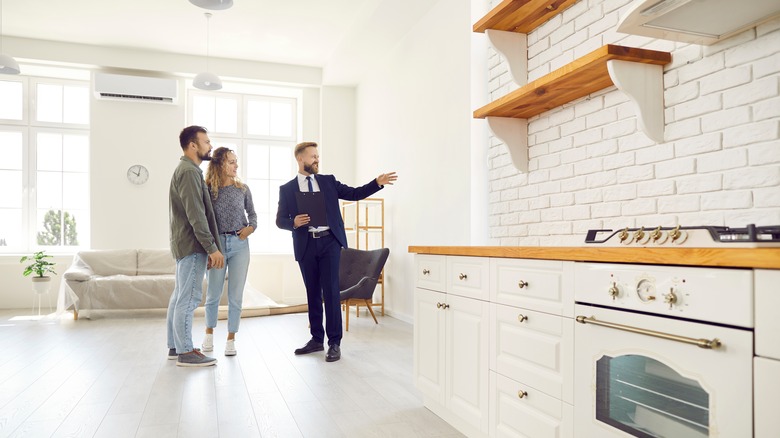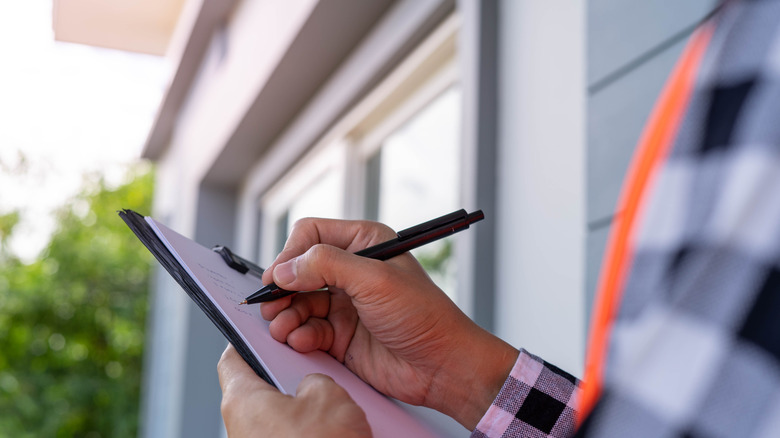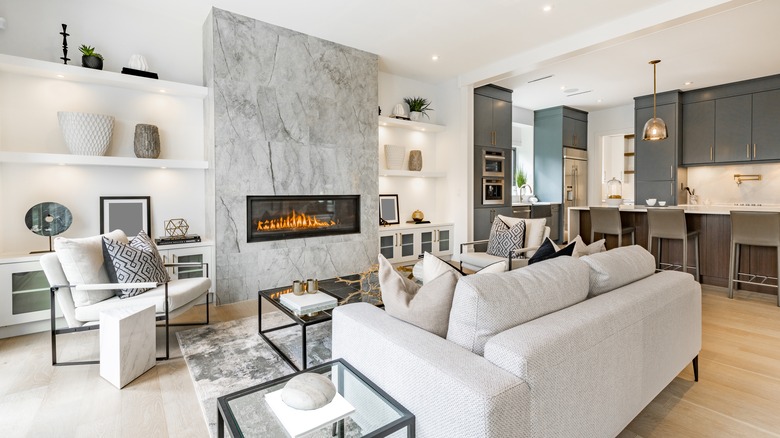Real Estate Expert Reveals Everything You Need To Do Before Buying Your First Home - Exclusive
No matter how many times you've done it, unless you're a seasoned house flipper with a never-ending list of real estate purchases under your belt, buying a home is an incredibly challenging process. From finding the right space that fits all your needs to ensuring you have all your documentation in place, there are countless things to consider and endless items to check off your to-do list — and you definitely don't want to miss anything. After all, for most people, a home is likely the most expensive thing you'll ever buy.
And that's not even taking emotions into consideration — according to Zillow, half of all US home buyers found themselves in tears at least once during the purchasing process, with that number rising even higher for younger millennial or Gen Z buyers. Not to mention, in many markets, competition is sky high, with buyers competing in bidding wars (resulting in some potential buyers inevitably losing out on what they felt was their dream home).
If you're buying your first home, it likely feels even more overwhelming and intimidating because, well, it's the first time you've ever gone through the process. Luckily, there are plenty of experts that can guide you through the entire home buying process and share their knowledge, such as Brian Burke, owner and managing broker of Kenna Real Estate. Burke spoke exclusively with House Digest, sharing his list of factors that any first-time homeowner absolutely needs to know before making the big purchase.
Get your finances ready to go
Especially in competitive markets, you don't want to miss out on your dream home because you need extra time to get your paperwork and finances in order while someone else came to the bidding table already prepared. You want to have everything you need for success — this means getting your finances ready to go.
First of all, when home ownership looks like it may be on the horizon, Burke recommends strengthening your credit score. "Your credit score can turn out to be a determinant of whether you can qualify for a mortgage or not," he explains. "So, you should be careful of paying all the bills on time and keeping your credit card balances as low as you can." This also has the benefit of potentially helping you secure a better rate — as Burke warns, your credit score "can affect the rate of interest that lenders are going to offer you."
Once you feel confident in your credit score, you'll also want to ensure you're pre-approved before you even start going to open houses and making your list of must-have features. "A pre-approval letter shows the seller that you can really afford the home," says Burke. And, it may prove to be just the ticket when you're submitting your offer and keeping your fingers crossed that you're the successful bidders. "[A pre-approval letter] provides you with some negotiating power and offers you a greater chance to have your offer accepted," he shares.
Have the right agent in your corner
Yes, the prevalence of online real estate listing websites means you can easily browse many of the homes on the market in your desired area, clicking through all the images to determine whether a particular property is worth an in-person visit or not. However, your real estate agent is a crucial part of the home-buying process. According to Burke, "the right real estate agent can help you meet the perfect home that meets your needs and preferences."
Not to mention, the right agent can be an incredible asset because of how they "can make things easy for you in the negotiation and closing process," Burke advises. Given how overwhelming and complicated the process can be, especially for first-time home buyers, having someone knowledgeable in your corner is absolutely invaluable.
So, how on earth do you find an agent who will be the right fit for you and your needs? First of all, as you'd do when looking for any service professional, you can get some referrals from others who recently went through the home buying process, Burke says. If you don't have anyone who falls in that camp, just take matters into your own hands: "you can interview a few agents and then request them for references," he recommends. During the interview process, Burke suggests that "you should ask them about their experience in helping first-time home buyers and investigate their expertise with the local market."
Make sure there are no nasty surprises
No matter how perfect a home looks, it's impossible to check out every last detail just by doing a quick tour. After all, you need to know about more than just how the home looks — you need all the information about any potential problems. If your home has issues, you definitely want to know about them before you put in an offer (and, depending on how serious the issues are, you may even want to withdraw your offer and try again with another property). That's why you absolutely need to pay for a home inspection.
"A home inspection is an assessment of a home's structural and mechanical systems," explains Burke — AKA all the things you won't necessarily be able to see. "Professional inspectors can help you to find out issues with the home that you are planning to move in so that you can make a better and more informed decision on buying the property," he adds.
Especially when you're already paying for so many things as part of the home buying process, it might be tempting to save a few dollars by skipping the home inspection. However, you just don't want to take that risk. As Burke warns, ignoring the home inspection "can threaten the safety of you and your family member, and cause you to spend thousands of dollars on renovations you aren't ready for." It's definitely worth the investment to avoid any nasty surprises down the line.
Create your must-have list
Once you start visiting potential homes in person, walking through the light-filled hallways and checking out the gleaming, freshly-renovated kitchen, you may find yourself suddenly deciding that there are certain things you really want in your home that weren't even on your radar before. Before you ever step foot in an open house, Burke warns, "you must have a clear idea of what you are exactly looking for in your dream home." It may seem like a simple tip, but it's an important one.
He suggests identifying which features you absolutely can't envision your dream home without, and which features are things you enjoy but could potentially compromise on. "Differentiating between the wants and must-haves will make it easy for you to buy a home that matches your needs and preferences perfectly," he explains.
As for the types of features to consider, Burke has some guidance there as well. First, you may have heard the real estate adage that it's all about location, location, location — and there's definitely truth to that. "The type of neighborhood you'd prefer to live in" is on Burke's list of features you need to have a clear idea of, whether that means you want to be near parks and green space or within walking distance of a plethora of cute cafes. And, within the home's interior, Burke advises that first-time homebuyers should "identify the right features, style, and floor plans that can match your preferences."




